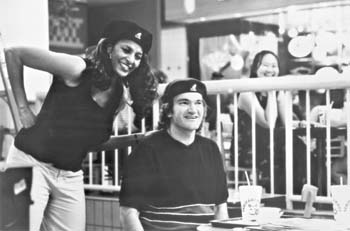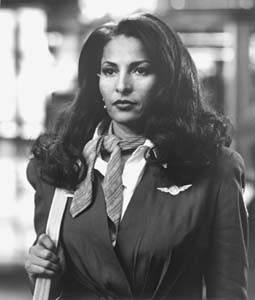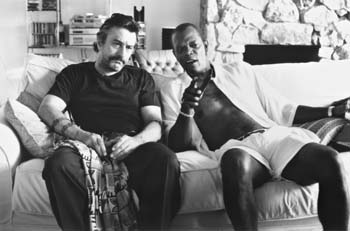Grier Window
'Jackie Brown' is a talky Tarantino love letter to famed blaxploitation icon of the 1970s Pam Grier
I WATCHED a reporter from Black Diaspora magazine get right into Samuel L. Jackson's famous face over his use of the word "nigger" in the new Quentin Tarantino movie, Jackie Brown. Jackson--as fiery a rageball as the screen offers today--lost his temper. "Why are you so offended?" he asked, almost shouting. "In the script, that word is used as a term of endearment as often as it is derogatory. Where did you grow up?"
Trinidad, she told him. And where she came from, they don't use that word. It's an insult. How was she to recommend a movie if it insulted her people?
"I grew up in Tennessee, where I heard that word yelled at me from off of buses," Jackson shot back. "Believe me, if I'm not offended by it, why should you be?"
"Because people in the audience snickered whenever they heard it!" the reporter answered.
There were a few other critics at the press table. Jackson looked around for support--as if white liberals like me were going to say they thought the word "nigger" was good fun! And Jackson does use the word quite a bit in Jackie Brown. He admitted, "I use it four times in one sentence."
A little later, after he calmed down, I changed the subject and asked Jackson what his methods are for projecting menace. He demonstrated.
"I just get a look on my face like my mother used to give me when she wanted me to shut up, but she didn't want to say so out loud," Jackson explained. "Sometimes I look at a person and think, I'm going to kill you ."
Jackson demonstrated the correct posture. He leaned forward, raising his shoulders up and crossing his arms tightly, high up in front of the breastbone, fists tucked inside elbows, as if his hands were cold. He glared at me frostily. I was impressed; he was just as scary in person as he is on the big screen.
"Anyone here laugh when they heard that word?" Jackson asked.
"No, I don't use that word, and I don't snicker when I hear it," I replied, which was a half-truth. Later on, I remembered someone who could make me laugh when I heard it.
LIKE ANY other important social movement, Quentin Tarantinoism is a coalition. Pulp Fiction was a prestigious, Oscar-winning hit--the Jaws of independent cinema--and it upgraded ideas of what riches and honors could be expected from a little film. A small part of the crowd that made Pulp Fiction successful enjoyed the writer-director's wit, use of vernacular and scene structure. The larger part liked what the CIA used to euphemistically call "wet work": the blood and the torture scenes.
Immediately, Tarantino became the most imitated director of his age. As the years rolled by and one Tarantinoesque crime film after another debuted and died, Tarantino's fans wondered what their hero could do to follow Pulp Fiction.
Based loosely on Elmore Leonard's Rum Punch, Jackie Brown is the tale of an aging stewardess (Pam Grier) living in one of the divorce-apartment towns near the L.A. airport. At peril of her life, Jackie must outsmart a cluster of little criminals, especially a lethal Jackson as minor gunrunner Ordell. (Jackson wears a braided rat-tail of a beard, which only adds to the scaliness of his detached, cold-blooded character.) Robert De Niro plays Ordell's sidekick, a stoned-out ex-con. A white bail bondsman named Max Cherry (Robert Forster) is Jackie's guide to the gray area on which both sides of the law meet.
Tarantino likes fast-moving trash, but he also likes the frosty, elliptical films of Jean-Pierre Melville and Wong Kar-Wei. (Tarantino has overseen the release of Melville's Le Samourai and Kar-Wei's Chungking Express under the banner of his Rolling Thunder Films.) Despite the ad campaign, Jackie Brown has none of the cartoony violence or the pulse that made Grier a goddess of blaxploitation.
The movie is more about conversations than it is about crime or bloodletting, and Tarantino will disappoint the sanguinary fans who were such a sizable part of his audience. Unfortunately, the virtue of Leonard's prose is its compression, and Jackie Brown is an unwound film. At more than 2 1/2 hours, it's the sort of movie that only the very patient can love.
Jackie Brown is also a love letter to Grier and the bustout movies she made in the 1970s. The character in Leonard's novel is Jackie Burke; Tarantino changed the name to echo Grier's best-known role, in 1974's Foxy Brown. In such films as Coffy (1973), Friday Foster and Sheba Baby (both 1975), Grier developed a following as a karate-fighting beauty. So much else has changed since then, but Grier is as striking as she was in her youth. When she enters a room, she's high on her comeback.
GRIER ISN'T SILLY, though; she has the common sense of an actor who has been both in and out of style. Between this heyday and her last, she told me, she was back at her old job doing accounting for a Thrifty drugstore.
Naturally, Grier still has a soft spot for the decade that made her famous. "The seventies were the reward for the fifties and sixties," she said, ticking off some of the highlights: "People started infusin' and includin'. The seventies exploded with political, social, religious and gender freedoms. Blacks are allowed to be Buddhists as well as Baptist. The women's movement began. Jimi Hendrix is allowed to play white rock & roll without being called an Uncle Tom; white people are allowed to go see James Brown and Tina Turner without being called 'nigger lover.' All of that spirit was incorporated in our movies. We were part of that, too."
Some call the kind of films Grier appeared in exercises in stereotyping. Others believe that the characters Grier and the other stars of blaxploitation played were powerful figures--radically different from the maids and comic-relief roles black people had played since before the streets of Hollywood were paved.
Grier explained, "These conservative groups like SNCC and CORE, they were asking us to do conservative movies. We said, 'Ah, but will you come to them?' We'd found our audience, a huge audience."
In the '70s, movies reflected the malaise of Vietnam and Nixon--not to mention the woes of an elderly studio system that was giving up the ghost. If blaxploitation films are remembered fondly, it's because they were simple pleasures, easy melodramas in stark shades of black and white, so to speak.
"Now, blaxploitation. It's a word like black magic, black ball, black hole. Ah, it's negative," Grier said, gesturing with an immaculately manicured hand.
"Blaxploitation was a marketing term by NATO, the National Association of Theater Owners, meaning the film was for black audience," she continued. "If you have a political agenda, you describe blaxploitation as a black film made for black audience, where whites make the money. Well, blacks made blaxploitation. And they made the money, too. So we can't generalize what blaxploitation means. It would be arrogant to say it was negative or positive."
It's not that Grier has renounced the vigilante films she made--it's just that she outgrew them: "When I saw Meryl Streep in Sophie's Choice, that's what I wanted to do."
Grier had been making the transition to writing and directing when Tarantino, a longtime fan, phoned her. "He calls me in New York, saying, 'Yo, is Pam there?' " Grier remembered. "And my husband said, 'Hey, there's this black man on the phone for you named Quentin.'
" 'Pam, I got an idea for you,' he tells me when I pick up."
Grier was skeptical at first. "Quentin, he's the hottest property in the movies, and he's gonna write for me. Surrrrrre. It won't be that he won't want to do it, it'll just be that Kevin Costner will call him first. Quentin'll have to do some big megabuck movie, and he won't be able to write for me before my teeth fall out and my breasts sag."
Tarantino had considered casting Grier for the Uma Thurman part in Pulp Fiction but eventually gave up, believing that she didn't think she fit the role. Tarantino boiled with energy talking about Grier, his rapid-fire talk getting even speedier.
"Like, I'd always wanted to work with her," Tarantino said. "Jackie had to be 44 but look 34, and seem cool-headed, as if she could handle anything. It sounded like a Pam Grier movie to me--just an older, wiser Pam Grier movie. People ask, 'Is she like Coffy 20 years later?' Not really; she's not the bad-ass superchick. She doesn't use kung fu on people. She's a real human being stuck in this situation. It's like putting Clint Eastwood in Unforgiven: an icon used in an un-iconic role."
SINCE Pulp Fiction, Tarantino has been involved in only a few films: the badly received anthology Four Rooms and the hilarious vampire shocker From Dusk Till Dawn. Looking back over the last couple of years, Tarantino says that he is most proud of his development as an actor. Indeed, his next work will be playing the beatnik psycho part in a Broadway revival of Wait Until Dark.
"I actually apply a lot of things I've learned as an actor," Tarantino said about the making of Jackie Brown. "I mean, I've been directing Robert De Niro, but I've been learning from him too. I shot the film in a slightly different style--not the visual style but in directing methods. I've heard actors referring to it as 'moment by moment.' Like, instead of having everything predestined, you let each moment happen. We weren't rushing to get to a result; we were enjoying the journey."
With that kind of attitude, Tarantino realizes how unlikely it is that Jackie Brown will be the sort of hit its predecessor was. "This isn't Pulp Fiction," he admitted. "I can't get involved in that game. I'm not a rock star, and I'm not trying to follow up Frampton Comes Alive! For lack of a better analogy, Pulp Fiction was more of an opera; Jackie Brown is more of a chamber piece, a character-driven study--a more mature film, an older film. I'm going to do another movie after this movie, and another movie after that movie and, God willing, another movie after that. Building a body of work is what I'm about."
The question is whether this body of work will continue in the vein seen so far in his films. Tarantino is exploring not only the place where humor and horror meet but also the borderlands between black and white people. And the question of whether it's his place to look over the issue of race in America is one he's heard before.
"I don't believe I'm presenting black people in a negative light," Tarantino said urgently. "I'm presenting them in a human light. I ... am ... a ... writer. And you come to me one of two ways: Are you actually thinking, in your heart, am I a racist? [Or] if you're coming to me as a writer, regarding my freedom to write characters, [then] to say that because I'm white, I can't write blacks, or have the characters talk the way I feel they should talk--to me, that is racist. I'm creating the characters. And I can honestly tell you that where I'm coming from, I'm not lying: the characters are true to themselves.
"I don't know if I want to be black. I have an affinity for black culture; it has nothing to do with my pigmentation. I just grew up around a lot of black guys, and there were black influences inside my household. My mother used to date black men."
Tarantino added that growing up in a two-toned part of L.A. helped his use of black dialect. "It's no different than if you were American and lived in Paris for a while. You have this French attitude. And when you get around a bunch of French people, you speak French."
An excellent point. They say you can live in France a long, long time, but if you weren't born French, you'll never be French.
YOU KNOW, me and Tarantino have a lot in common. We were both pot-headed youths in the cheap parts of the west side of L.A. I have no doubt that we sat in the same audiences for revivals at the Filmex or the Fox Venice or the NuArt. We both had absentee fathers with whom we were on strained terms. Both of us looked up to a string of mom's boyfriends and mom's buddies who came and went. (P.S.: My mom's longtime boyfriend used to take us to the Cockatoo Inn, the since-demised prime-rib lounge on Hawthorne Boulevard where Tarantino set a few scenes in Jackie Brown.)
"I was one of these young men," Tarantino said, "who didn't have a father--who had different father figures throughout their lives. It's not one figure throughout. It's one here and one there; it's never the same figure."
Knowing that milieu also means knowing the importance of Richard Pryor as a writer, comedian and performer. In either the crummy Hollywood movies he made to stay alive or in his concert films, in which he seemed to bridge the races, Pryor was the most important comedian of his time. No one seems to mention what an influence Pryor is on Tarantino's dialogue, especially in the hideo-comic shock use of the word "nigger"--a shock paid for in Pryor's own experiences as a black man in America. When Pryor says the N-word, I laugh. You'd have to be Winnie Mandela not to laugh.
Still, Tarantino isn't Pryor. Despite--or, rather, because of--his nonchalance about the last really loaded word, Tarantino has been as quickly backlashed as he was quickly applauded. Pulp Fiction and Reservoir Dogs led to white kids laying "nigger" and "bitch" on each other as if they'd just done a nickel at Soledad instead of three years in prep school.
It's the old predicament--is an artist responsible for the kind of fans he creates? Before Pryor there was Lenny Bruce, who in a famous monologue peppered an audience with "nigger" on the grounds that if you hear the word repeated enough times, it will be deprived of its power to make a child cry. That was 40 years ago. Since then, there's no evidence that the trick worked.
[ San Jose | Metroactive Central | Archives ]
![]()

Pulp Pals: Pam Grier and Quentin Tarantino on the set of 'Jackie Brown.'
The '70s Were Better Than We Think: Blaxploitation icon Pam Grier is living proof that some performers never go stale.
Couch Potatoes: Robert De Niro and Samuel L. Jackson plot some trouble in 'Jackie Brown.'
Jackie Brown (R; 154 min.), directed and written by Quentin Tarantino, based on the novel by Elmore Leonard, photographed by Guillermo Navarro and starring Pam Grier, Samuel L. Jackson and Robert Forster.
From the December 24-31, 1997 issue of Metro.
![[Metroactive Movies]](/movies/gifs/movies468.gif)